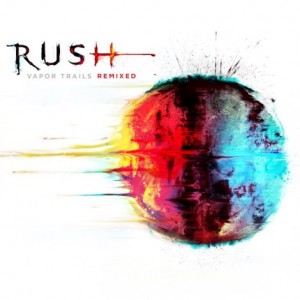Dw Dunphy: Vapor Trails probably has an undeserved degree of importance behind it because of what it represents versus what it actually sounds like. For many, this was the point one of their favorite bands was resurrected from the ashes. Between this and Test For Echo were the usual requisite live recordings, Alex Lifeson’s Victor project, Neil Peart’s Burning For Buddy tribute compilations (to Buddy Rich), and Geddy Lee’s solo record My Favorite Headache. But it was also a period where twin tragedies occurred in Peart’s life, and the whole rock and roll thing suddenly seemed superfluous to him (as his writings have reflected). His catharsis was getting on his motorcycle and riding through North America. It wasn’t getting behind the drums which, I speculate, must have felt like another piece of a life that had been ripped away from him.
 So Vapor Trails is a totem of that which probably shouldn’t have occurred, if everyone was resigned to walking away from this entity they raised up.
So Vapor Trails is a totem of that which probably shouldn’t have occurred, if everyone was resigned to walking away from this entity they raised up.
For myself, excitement was met by muted disappointment when I heard the first single, ”One Little Victory.” It was just angry and relentless, arriving at a time when rock was content to be angry and relentless. That colored my impression of the rest of the album when I got it. It felt leaden and loud, even though the individual songs had a feel not too dissimilar from the material from Counterparts.
I couldn’t warm to it, and it hung back in the collection unheard for many years. My brother John, also a fan but certainly more objective than I about it, said to give it another try. The songs were not that bad and no, Rush was not trying to ”metal it up.” I resisted, but the arrival of Vapor Trails Remixed has allowed me to re-evaluate the songs — and this time it really is about the songs — and not the sound, or the backstory, or the circumstances that got us here.
Chris Holmes: See, I was a fan of Vapor Trails from the start. Test for Echo, while not bad, was a HUGE letdown from Counterparts and contained some of the most uninspired songwriting of Rush’s career. “Virtuality,” anyone?
Ted Asregadoo: ”Net boy…net girl…Put your message in a modem and throw it into the cyber sea.”
CH: The thing about Vapor Trails is that, despite sounding ”angry and relentless” as you put it, it really is an album of celebration. If that’s not always evident in the lyrics, which are a huge improvement over T4E, then it certainly is in the music, which is totally energized.
And that’s why this remix was so necessary and so anticipated by fans. We wanted to be able to share fully in the celebration, but the aural effect of the original Vapor Trails was akin to standing on the boat they shoot the Macy’s 4th of July fireworks from. You’re dimly aware of something really cool going on, but the roar is almost deafening and you’re choking on the smoke. This remix allows you to sit further back and enjoy the individual explosions.
Ted: After Test for Echo, I too was disappointed in Rush’s output. I went to see them on the Test for Echo tour, and while they did play a fair number of songs from that album, they were generally sandwiched between songs that were much stronger. The high point of that tour, though, was that they did ”2112″ in its entirety. Overall, I was pretty happy with the show, but there was something sterile about performance. This was after their ”break” where Neil went off to reinvent his drumming and Alex put out Victor. So, it seemed the guys would come back to Rush with some fresh song ideas. Unfortunately, that wasn’t the case. I do like a few songs on Test for Echo, but overall it’s an album that just lumbers along.
After the death of Neil’s daughter and wife in the late 90s, I figured Rush was kaput. Different Stages felt like a ”goodbye” to the fans with the inclusion of the bonus disc of their Farewell to Kings tour… and then everything kind of went dark for them. I tried to keep up on what was what with the group, but it seemed like it was over — especially when Geddy Lee released My Favorite Headache.
And then…
The announcement came that the band reformed and was working on new material. When Vapor Trails was released on May 2002 I was pumped. Add to that, the interview Geddy and Alex did with Anthony DeCurtis at Rolling Stone just before the album dropped, and I knew the boys were back for the long haul.
I purchased the album the day it was released and sat in the parking lot in my car at Las Positas College (where I was working) and went through track by track…and was disappointed. I wasn’t ”feeling it,” and was worried that A.) My tastes had changed. Or B.) Rush had lost it. But then something happened. The more I listened to the CD, the more I liked it. I grew to really love many of the songs on the album (”Vapor Trail,” ”Earthshine” and ”Freeze”). It was certainly louder than anything I’ve heard Rush lay down on a record, but I chalked it up to them wanting to show the world that they were back and were done with the sterile ”sheen” of Test for Echo. The more I listened to the music, however, the more I heard clipping and muddy production — which was so uncharacteristic for Rush. Sure, I appreciated the hard rock aspect of the record, it just sounded crappy.
DwD: Which is definitely why the remix was necessary. You actually hear that now, whereas before it was all volume and bluster. I was listening to it this morning and, only now, recognize that this is some of the poppiest (in a good way) stuff they had done in years. David Bottrill (King Crimson, Tool, Peter Gabriel) did the mix and dialed back the massive chunks of guitar so that individual things could be heard, like the depth of Geddy’s harmony vocals.
 David Medsker: My initial reaction to the record was unquestionably clouded by my disappointment with Test for Echo (”Dog Years”? ”DOG YEARS”?). The other problem was personal: for well over a decade, Rush and I seemed to be on the same page musically. As they tried new ideas and sonic directions, they were always right in line with my interests, and then Test for Echo came along, and for the first time, I was worried that Rush and I were growing apart. I hoped Vapor Trails would mend the fences.
David Medsker: My initial reaction to the record was unquestionably clouded by my disappointment with Test for Echo (”Dog Years”? ”DOG YEARS”?). The other problem was personal: for well over a decade, Rush and I seemed to be on the same page musically. As they tried new ideas and sonic directions, they were always right in line with my interests, and then Test for Echo came along, and for the first time, I was worried that Rush and I were growing apart. I hoped Vapor Trails would mend the fences.
It didn’t.
It seemed needlessly aggressive and overplayed, like they had something to prove (they didn’t). I haven’t listened to the album since a couple weeks after I bought it, and I’ve since sold my original copy of it. I’m basically listening to it for the first time with this.
DwD: I maintain that the only reason why “Dog Years” exists is to get Rush saying a curse on a song. And because it is Rush, they had to use “bitch” correctly. That doesn’t make the song any better though, even though the melody is nice.
CH: Having completed my first listen, I think what the remix has done is to make the good songs breathe more and feel much more spacious and dynamic – at least compared to the original album. It still suffers from the problem most modern rock albums do in that there just aren’t a ton of peaks and valleys.
But enough opinion, let’s have some SCIENCE! Here’s a side-by-side comparison of ”Peaceable Kingdom” from both versions of Vapor Trails. Can you tell which is which?

So there’s good news and bad news here. The good news is that the absolute brickwalling hatchet job has been fixed somewhat. The bad news is there is still some clipping and that can likely never be fixed.
DwD: That’s just modern audio. It’s much better, but they are still going to shoot for volume thresholds.
Ted: The remix has done more than lower the volume. David Bottrill has moved some elements around, brought the vocals to front of the mix (with better EQ) and even switched up vocal takes to add more dimension to the songs. Also, he’s brought a crispness to the drums that was missing and layered Alex’s guitar parts in a more even-handed way. To me, there’s a lot on this remix that was just missing from the original recording. It made me realized how many layers of music and vocals were buried under a really bad mastering process.
CH: I know, but I couldn’t resist the urge to go into Steve Hoffman Forums mode a bit. For yet more visual evidence of how the Good Old Days truly are gone, here is what ”Grand Designs” from Power Windows (86) looks like:

So there you go. The other bad news is that the mediocre songs on Vapor Trails are still mediocre. And most of these tracks still go on for at least 45 seconds to a minute longer than they should.
DwD: Absolutely. Vapor Trails, just like Test For Echo, suffers in that there is a really good classic-sized 45 minute album in there…unfortunately they are buffered by some unnecessary blubber.
Ted: I made a copy of Vapor Trails for a friend of mine when it came out in 2002, and I titled it ”Without Jar Jar Binks.” I don’t know if you remember when someone recut Star Wars Episode I: The Phantom Menace and sliced out all the scenes with Jar Jar, and it was actually a better movie. Well, using the ”let’s just get rid of Jar Jar” logic, I took out what I thought were bloated songs on the album. I thought the album sounded better, and my friend did as well (he compared both versions). I can’t remember all the songs I cut, but I know that ”The Stars Look Down” and ”Nocturne” were two of em.
DM: I’ve had a theory about Rush for a while. I’m not sure I can articulate it, though. Here goes nothin’.
It is my opinion that Rush has always been acutely aware of the changes in the musical landscape that were happening around them. Notice the Police-like rhythms in ”New World Man,” the oversynthed Grace Under Pressure, recruiting Aimee Mann for ”Time Stand Still,” and even the grunge-like D-tuning of ”Stick It Out.” They were always listening to how the world was changing, and evolving along the way.
 And then Kurt Cobain died, and believe it or not, that affected Rush greatly. Do you remember what music was like in the years after his death? Modern rock was lost, and classic rock was dying. I think this vacuum at the top caused Rush to lose their bearings on what kind of music to write. They were always so good at balancing hard, punishing riffs with a generous amount of melody, and then all of a sudden, the melodic element to their songwriting was gone. That is my problem with Test for Echo and Vapor Trails. Too much riffage, not enough melody. The new mix job is nice, but I still can’t sing along to it. .
And then Kurt Cobain died, and believe it or not, that affected Rush greatly. Do you remember what music was like in the years after his death? Modern rock was lost, and classic rock was dying. I think this vacuum at the top caused Rush to lose their bearings on what kind of music to write. They were always so good at balancing hard, punishing riffs with a generous amount of melody, and then all of a sudden, the melodic element to their songwriting was gone. That is my problem with Test for Echo and Vapor Trails. Too much riffage, not enough melody. The new mix job is nice, but I still can’t sing along to it. .
CH: I think that’s a fair point. As much as people focus on the instrumental abilities of Rush, one of their greatest strengths — particularly in the 80s — was Geddy’s vocal melodies. Starting in the 90s, but particularly evident starting with Test for Echo, there was a noticeable drop off in that area. Without a good vocal melody to ride on top of all those complex riffs and arrangements, a song has to be musically tight to avoid drifting.
DM: YES.
Ted: Around 1995, I was in grad school and talking about music with one of my classmates. I told him about how much Rush’s music meant to me, and he was sympathetic, but added: ”The are certainly accomplished musicians, but they are followers…not leaders in music.” We started talking about Counterparts and he said that it was an obvious nod to grunge, but it didn’t push any boundaries. I agreed, but thought that Rush, in their desire to progress with trends in rock music, were dabbling in grunge probably because grunge owed so much to hard rock of the 70s — which Rush was certainly part of.
DM: I’m very much a pop song-oriented kind of guy. I need a hook, and Vapor Trails doesn’t have a single memorable vocal line. It was also the first time I felt as if they were overdoing it in terms of the instrumentation. I realize I’m opening myself up to a load of snark by saying that, but ”Ceiling Unlimited,” for one, has way, way too many drum fills.
Sorry, we’re supposed to be talking about the mix job, aren’t we? I keep getting sidetracked by the fact that this album just doesn’t engage me.
CH: I think the remix does what it set out to do, which primarily was to reduce the level of sonic sludge and make the album less physically painful to listen to. On that count alone, it’s a success. Of course, opinions will vary as to whether or not Vapor Trails is now a better album, but since â…” of the band seem to feel strongly that this is closer to the album they wanted to release I think we at least have a better chance to fairly judge it.
And before anyone trots out comparisons to George Lucas or any other other artist who can’t stop from tinkering with old material, I think the guys have demonstrated enough integrity over the decades that I believe them when they say this is how the album should’ve sounded.
DM: Wait, who is the one who is fine with the original mixes?
Ted: Not me! But I agree with Chris. The album was a big wart in their catalogue as far as the production goes. I think David Bottrill fixed many of the production flaws, and added some surprises that worked sometimes, but other times didn’t. It’s a cleaner recording, there’s more separation, and the songs, as Chris said, have room to breathe. My quibbles with the remix come down to a couple of elements. In ”Secret Touch,” there was a point about halfway through the song where Alex does this hypnotic riff for a couple of bars and then Geddy and Neil add some bass and drum punches. David Bottrill brings in the vocals right away — which, to me, takes away the buildup back into the pre-chorus. Also, in ”Ceiling Unlimited” there’s the inclusion of lead break that’s not in the original. To me, Rush was correct in leaving it out, but Bottrill included it. It doesn’t really fit in a musical sense to me, but maybe I’m just so used to the original mix that it sounds jarring to me.
 DwD: I won’t stand up for the original mix, and I’m also glad that this correction was made, but it troubles me nonetheless. I can see yet another audience-milking scheme in the eyes of the industry if this release does well. A decade-plus over over-loud, overheated mixes represents yet another opportunity to double-dip on preexisting assets. Metallica’s Death Remixnetic, anyone?
DwD: I won’t stand up for the original mix, and I’m also glad that this correction was made, but it troubles me nonetheless. I can see yet another audience-milking scheme in the eyes of the industry if this release does well. A decade-plus over over-loud, overheated mixes represents yet another opportunity to double-dip on preexisting assets. Metallica’s Death Remixnetic, anyone?
CH: I suppose there’s always that opportunity. If done right, however, I’m OK with it. The Doors remasters from a few years ago are some of the best I’ve ever heard, and have become my personal gold standard for how projects like that can really give you a fresh take on old material. And at the end of the day, no one is forcing you to buy any of this stuff.
But at least in the case of Metallica, I have the Guitar Hero mix of Death Magnetic and wouldn’t need a new version.
DwD: Yee-aaah, I’m going to need to hear that version to make my own determination there…(Sorry, Lars.)
Ted: I may be conflating sources, but Alex Lifeson expressed an interest in going back and remixing all of Rush’s albums…and then realized that albums represent a specific period of time. They are historical markers of what the artist was creating at that time with the instruments at his/her disposal (including the studio and the production techniques). Why mess with that? I mean, there are albums that should get cleaned up (i.e., Hemispheres and Presto, just to name a couple off the top of my head). But why would you go back and remix Moving Pictures or Permanent Waves? Those albums have a certain sound that I really love. Great separation of the instruments, and for hard rock albums, they had a lot of space in them. Other albums are a little too sharp on the ears (i.e., Power Windows and Hold Your Fire). Now, I know these albums got remastered, but remixing is an entirely different animal. I’m not sure if I really need to hear those albums with a new mix. As a money-making scheme, it seems crass, and there’s a something a little too post-modern about a group with a history as long as Rush going in there an messing with their history. Leave that thing alone.
DwD: If I have a last word on the subject, it’s this: Vapor Trails can now be judged on the part it should be judged by…the quality of the songs versus how poorly presented the sonics were. That has served the collection mostly for better, so good for those involved for carrying it off.





Comments